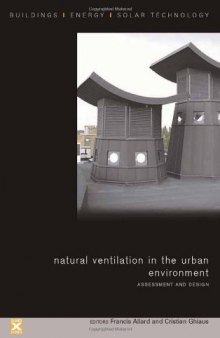 جزییات کتاب
جزییات کتاب
Throughout the world, there is an increasing interest in ecological design of buildings, and natural ventilation has proved to be the most efficient low-energy cooling technique. Its practical application, however, is hindered by the lack of information on the complex relationship between the building and its urban environment. In this book, a team of experts provide first-hand information and tools on the efficient use of natural ventilation in urban buildings. Key design principles are explained, enabling readers to decide on the best solution for natural ventilation of buildings, taking into account climate and urban context. In the initial sketches, architects need answers to open problems such as 'what kind of solution to adopt' and 'how to modify existing strategies to exploit the potential of the site'. This book formalizes the multi-criteria analysis of candidate solutions based on quantitative and qualitative estimation of the driving forces (wind and buoyancy), as well as of the barriers induced by the urban environment (wind speed reduction, noise and pollution) and gives a methodology for optimal design of openings. The book is accompanied by a FREE CD, containing software for assessing the potential of a given site, estimating wind speed and dimensioning the openings for natural ventilation. The methodologies and tools are tested, self-contained and user friendly. About the editors The editors, Cristian Ghiaus and Francis Allard, are affiliated with the University of La Rochelle, France. The authors and reviewers combine expertise from universities, research institutions and industry in Belgium, France, Great Britain, Greece, Portugal and Switzerland.



 دانلود کتاب
دانلود کتاب

 جزییات کتاب
جزییات کتاب





 این کتاب رو مطالعه کردید؟ نظر شما چیست؟
این کتاب رو مطالعه کردید؟ نظر شما چیست؟
